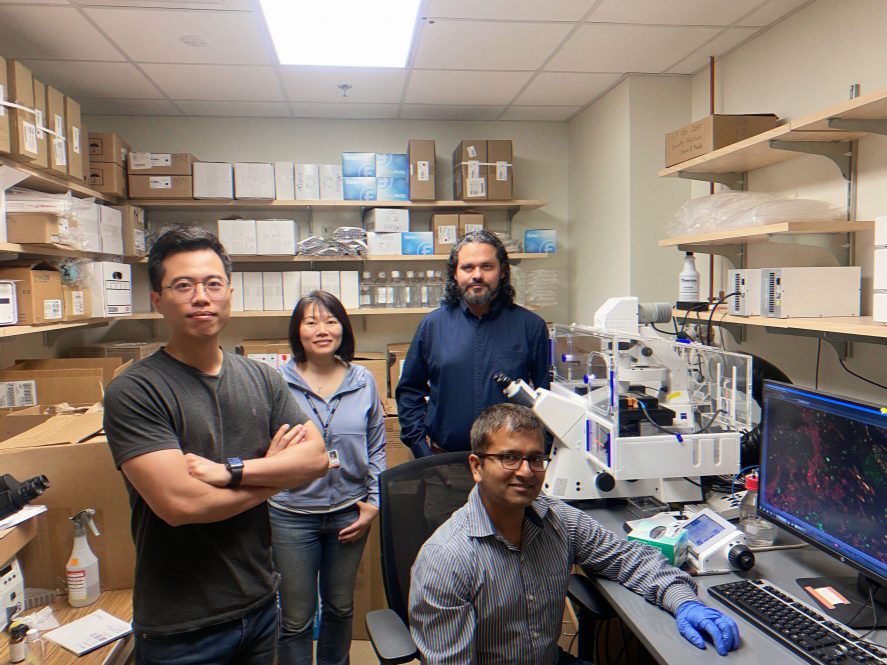
The maternal-fetal interface, a critical juncture during pregnancy, has long been perceived as a battleground where the fetal placenta invades the maternal body to access nutrients. Traditionally seen as a site of conflict, this interaction raises questions about why the maternal immune system tolerates what would typically be considered foreign cells. However, recent research suggests a more nuanced interplay of cooperation and competition, essential for a successful pregnancy.
In a groundbreaking study published in the latest issue of the Proceedings of the National Academy of Sciences (PNAS), Kshitiz, an associate professor of biomedical engineering at the UConn School of Dental Medicine, reveals that pregnancy is not merely a conflict but a sophisticated balance of cooperation and competition. This study, a collaboration with postdoctoral fellows Yasir Suhail and Wenqiang Du, Gunter Wagner at Yale, and Junaid Afzal at the University of California San Francisco (UCSF), challenges the traditional view of the maternal-fetal interface.
Revisiting the Maternal-Fetal Interface
The maternal-fetal interface, often likened to an unresolved frontier between nations, is a complex interaction zone between maternal and fetal cells. Wagner, a former chair of evolutionary biology at Yale, and Kshitiz have previously posited that cooperation is necessary to sustain pregnancy, despite the prevailing focus on genetic conflict. This study provides compelling evidence of such cooperation, reshaping our understanding of this vital biological process.
“The maternal fetal interface, for this is what the placenta-uterus interaction is called, is like an unresolved frontier between countries. There is so much difference between different species, which is not found for any other organ,” said Kshitiz.
The Science Behind Cooperation
In anticipation of pregnancy, the endometrium undergoes decidualization, a process where the tissue thickens to prevent excessive invasion by placental cells. Afzal and Du’s research highlights how placental cells influence maternal cells to degrade their own matrix, a surprising discovery that underscores the complexity of these interactions.
“It is this active persuasion by the placental cells which made the mother’s endometrial cells to reduce her own defenses by secreting a protein, which was so surprising,” Wagner noted.
Suhail’s modeling of molecular interactions between placental and endometrial cells as an electric flow problem further elucidates this dynamic. His model, derived from experimental data, was validated through experiments, showcasing the power of integrating computation with empirical research.
“It is rare, and heartening to see such close integrated collaboration between computation, and experimentation. My model was created by experimental data, and the discovery was validated by experiments,” said Suhail.
Co-opetition: A New Paradigm
The concept of co-opetition, a blend of competition and cooperation, emerges as a fitting description of the maternal-fetal interface. Inspired by a conversation with Dr. Anshuman Chutani, an economics professor from the United Kingdom, Kshitiz borrowed this term from econometrics literature to describe the induced cooperation between competitors at the maternal-fetal interface.
“It is a term which we gladly borrowed,” said Kshitiz. “It is not merely cooperation by the endometrium, but an induced cooperation between competitors.”
This interplay is crucial for the fetal cells’ ability to persuade maternal cells to cease building protective tissue, allowing effective placental invasion for nutrient retrieval. The readiness of the mother’s cells to respond to placental signals is a testament to the intricate balance of competition and cooperation, rather than mere conflict.
Implications Beyond Pregnancy
The implications of this study extend beyond understanding pregnancy complications such as placenta accreta and preeclampsia. The insights gained may also inform research on cancer metastasis, offering new perspectives on how certain cancers invade the body.
“This study, jointly conducted by scientists at UConn Health, Yale, and UCSF, can shift the way we think about conflict between the generations, right during when the fetus is still in mother’s womb,” said Kshitiz.
As research continues to unravel the complexities of the maternal-fetal interface, the balance of cooperation and competition may hold the key to unlocking solutions for a range of medical challenges. The study’s findings not only redefine our understanding of pregnancy but also highlight the potential for cross-disciplinary insights to drive scientific innovation.




